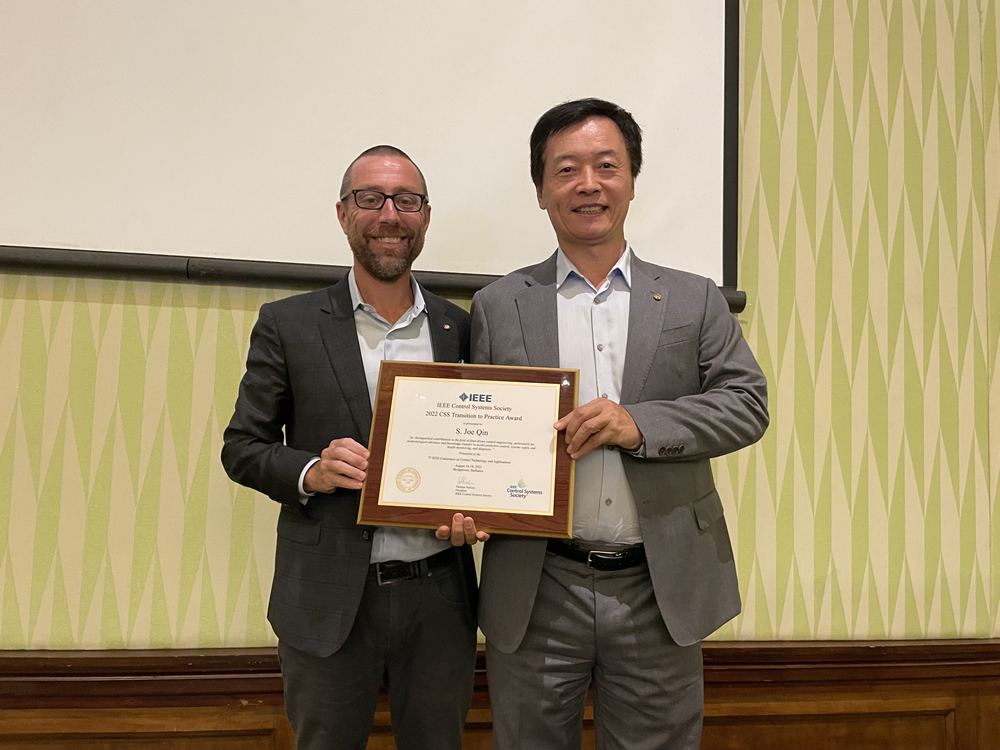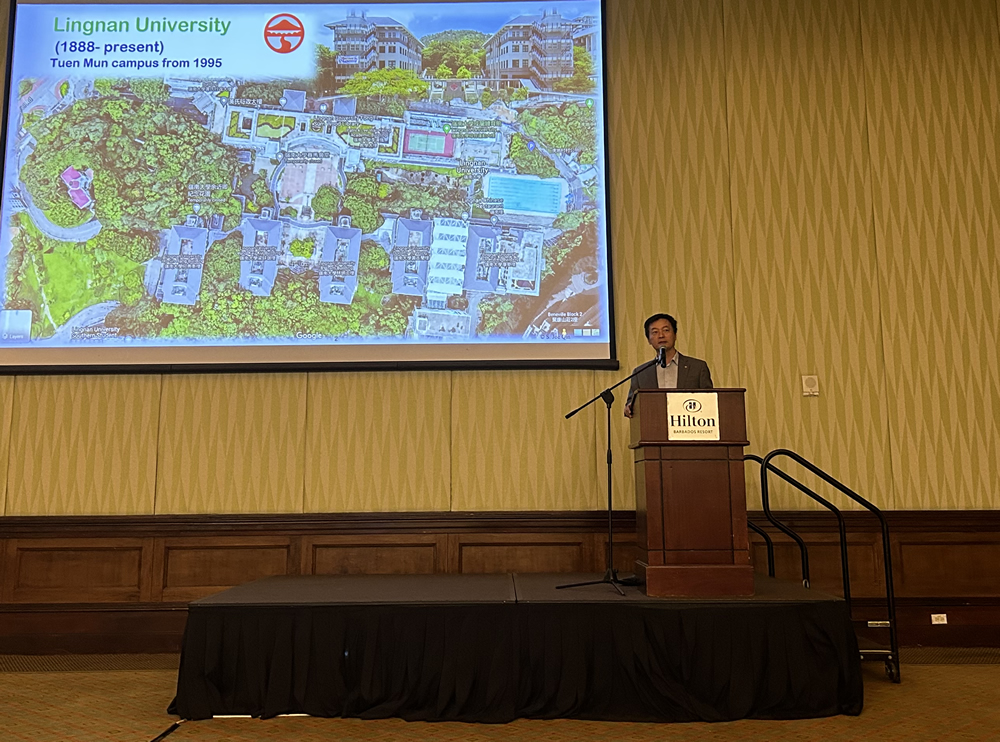Top award recognises research with real-world impact
Known for research projects which have a real impact on industry, Professor Joe Qin, the newly appointed President of Lingnan University, broke ground in another way recently by becoming the first academic based in Hong Kong and Greater China to receive a top international award from IEEE (Institute of Electrical and Electronics Engineers).
Presented annually since 2009, the IEEE CSS (Control Systems Society) Transition to Practice Award recognises outstanding collaborative scientific interactions between industry, research laboratories and the academic community.
Previous recipients include leading figures in the United States, Canada and Japan, and this year’s presentation ceremony took place during the 7th IEEE Conference on Control Technology and Applications (CCTA), held in Barbados in mid-August.
The IEEE is the world’s largest technical professional organisation whose mission is to advance technology for the benefit of humanity.

In honouring Qin, they made special mention of research he conducted when based at universities in the US, and how it had helped to resolve practical problems faced by the chemicals and semiconductor sectors, thereby improving manufacturing and production processes.
The committee also noted his breakthrough contributions in the area of data-driven control engineering. And they pointed to his successes in promoting methodological advances and knowledge transfer in systems safety, model predictive control, health monitoring and diagnosis.
“I knew I was nominated, however the pool of potential candidates is huge, from all over the world, and they are working in all sorts of domains and disciplines,” Qin said. “Of course, receiving the award means a lot to me because it is for people who have done good original research and seen it transition into practice. That is the kind of work I always wanted to do.”
In this instance, Qin was nominated by Professor Richard Braatz at MIT (the Massachusetts Institute of Technology), a former recipient of the award and member of the US National Academy of Engineering. The main thing was that his record demonstrated clear examples of “impact”, where results of research had been directly applied or commercialised, or could be shown to have advanced the development of technology.
“I’ve generally picked research topics that have good potential for application,” Qin said. “Since about 25 years ago, I have focused on new technologies on the horizon and what can be learned from data analytics.”
In particular, he took an early interest in “model predictive control”, which was an accepted practice in industry. He and his coauthor Dr. Thomas Badgwell were the first to provide a unified framework to reveal the principles of industrial practice. Using abundant data from operational control systems at AMD (Advanced Micro Devices), Qin co-authored another paper that studied how manufacturing conditions usually change over time, but some causing faults and disruptions, and devise an adaptive algorithm to detect faults.
“We were lucky enough to discover and define what was happening, come up with a framework and put it into practice,” Qin said. “It felt like we’d hit the jackpot, which was a pleasant surprise. A second surprise was how well the theory worked. We made some later adjustments, but it is now considered a milestone in that domain.”
Indeed, the original predictive control paper has subsequently received more than 6,000 citations on Google. Importantly too, it provided practical insights for industry and, in due course, played an influential role in automating chemicals and semiconductor manufacturing, doing fault diagnosis of possible defects, and developing better monitoring systems.
Separately, in collaboration with Aspen Technology, Qin also co-developed an IP (intellectual property) patent which is used in sensor validation and to pick up – and correct - errors in the industrial process.
At other times, he worked alongside in-house experts at Motorola, TI (Texas Instruments) and Intel to enhance efficiencies, upgrade productivity and help the bottom line.
“In a sense, these developments are progressive, not overnight breakthroughs; it can take persistence over 10 or 20 years” said Qin, noting modestly that he has quite a number of domain applications to his name. “But when I knew they were useful, I didn’t see major difficulties in persuading industries to adopt them.”
Over the course of his career, he has always been ready to take on new challenges. That is evident in the switch from a first degree in automaton to a PhD in chemical engineering, before focusing on industrial process engineering in chemicals, semiconductors, then smart energy, and now on data science.
“When I switch, there is some catching up to do, but I make 100 per cent effort to show I can make an impact in the new area,” Qin said. “In the latest case, my approach was to read a lot in the literature, go to conferences, talk to people in the new area, and find opportunities to work on real data directly. But I already had years of academic experience and a research network which helped in getting to talk to well-known people in the new area.”

In a plenary speech delivered at the IEEE conference, Qin understandably took the chance to reflect on some personal career highlights. But looking ahead, he also spoke about a new framework for dynamic latent variable (DLV) analytics and an application for “process troubleshooting”. And while stressing the need for greater domain knowledge to take full advantages of progress in machine learning and data analytics, he noted that innovations in technology should address real-world issues and be “acceptable and interpretable” for the people expected to use them.
In breakout sessions and more general discussions during the event, Qin outlined some of the plans and priorities for Lingnan University over the coming months. There will, for instance, be a major initiative to adopt generative AI and integrate data science tools in the curriculum. And there is a clear intention to create extra opportunities for overseas exchanges with partner institutions in North America, Europe, Southeast Asia and mainland China.
“Lingnan has good scientists and professors who are breaking new ground,” he said. “So I also hope to assist them in going after research grants for some of the bigger team projects in Hong Kong and the Greater Bay Area.”